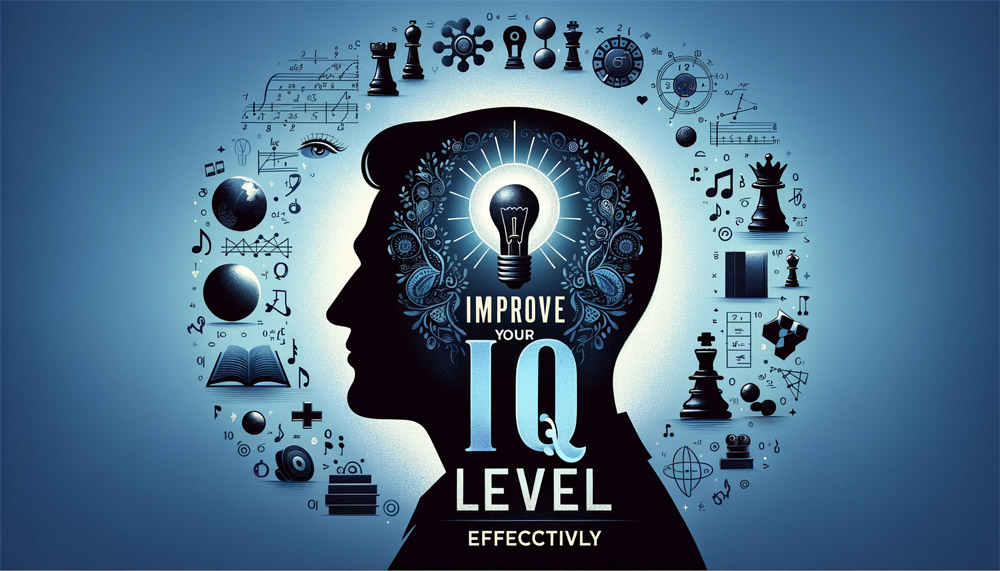
15 Steps to Improve Your IQ Level Effectively
Improving your IQ essentially means enhancing your cognitive abilities, which include memory, problem-solving, mathematical skills, spatial recognition, pattern recognition, logical reasoning, and verbal skills. Here are some foundational steps you can take to start improving these areas:
1. Read Regularly
Engaging with a variety of texts, such as novels, non-fiction, newspapers, and scientific articles, can expand your vocabulary and comprehension. Reading exposes you to different ideas and ways of thinking, which can enhance your ability to understand complex concepts and develop better reasoning skills.
2. Practice Math
Start with the basics of arithmetic—addition, subtraction, multiplication, and division—and gradually move on to more complex areas like fractions, algebra, and geometry. Solving mathematical problems helps improve abstract reasoning skills and problem-solving abilities. Websites that offer math problems of the day or apps that include math puzzles can be useful tools.
3. Play Logic Games and Puzzles
Games such as Sudoku challenge you to think logically and spot patterns. Chess requires strategic thinking and foresight. Even playing video games can improve spatial navigation, reasoning, memory, and perception, according to some studies. Dedicate some time daily or weekly to these kinds of games.
4. Learn a New Language
Language learning improves cognitive functioning by challenging the brain to recognize new structures and sounds. It can also improve memory and delay cognitive decline. Use language learning apps, take a class, or find language exchange partners to practice with.
5. Stay Curious
Being curious activates your brain's reward system, which can make the process of learning more enjoyable and effective. Ask questions about the world around you, research topics you're unfamiliar with, and explore new hobbies or interests.
6. Exercise Regularly
Physical exercise improves blood flow to the brain and may encourage the growth of new brain cells. Activities like running, swimming, cycling, or even brisk walking can have a positive effect on brain health.
7. Eat a Healthy Diet
Foods that are rich in antioxidants, good fats, vitamins, and minerals provide energy and aid in protecting against brain diseases. Consuming omega-3 fatty acids (found in fish) is known to boost brain function.
8. Meditate
Meditation can improve focus, concentration, creativity, memory, and learning. Studies have shown that meditation can actually change the structure of the brain over time, leading to improved cognitive functions.
9. Sleep Well
Sleep is essential for consolidating memories and cleaning up brain waste. It's also crucial for learning and forming new connections in the brain. Adults typically need 7-9 hours of sleep per night for optimal function.
10. Learn to Play an Instrument
This can increase the brain's gray matter volume in various regions, enhancing all sorts of cognitive functions. It also improves fine motor skills and audio recognition.
11. Engage in Social Activities
Regular interaction with others boosts mood and cognitive function. It can improve verbal skills and emotional intelligence and even stave off cognitive decline in later years.
12. Practice Mindfulness
Being mindful and practicing being present can help improve cognitive flexibility and reduce stress levels. Mindfulness helps you become more aware of your thought processes and increases your attention span.
13. Learn about Cognitive Biases
By understanding common cognitive biases, such as confirmation bias or the Dunning-Kruger effect, you can start to recognize them in your own thinking and correct for them, leading to better decision-making skills.
14. Take IQ Tests
Familiarize yourself with the format and the types of questions asked in IQ tests. This can include pattern recognition, logical reasoning puzzles, and spatial reasoning tasks. Practice tests can be found online and in many brain training apps.
15. Teach and Share Knowledge
The process of teaching forces you to learn and understand a topic at a deeper level. It also improves your communication skills and helps you see ideas from new perspectives.
By engaging in these activities, you can foster new neural connections and improve the efficiency of existing ones, which can enhance your cognitive abilities and increase your IQ score. Remember that consistency is key, and incorporating these habits into your daily life can lead to long-term benefits for your brain health and intelligence.
Remember, improving your cognitive abilities is not a one-time effort but a continual process. It's also worth noting that while IQ can provide a measure of certain cognitive abilities, it is not a comprehensive measure of one's overall intelligence or potential. Moreover, intelligence is multi-faceted and not solely defined by IQ scores.
Be patient with yourself, and focus on consistent, gradual improvement rather than quick fixes. Engaging in lifelong learning and maintaining a healthy lifestyle are key to enhancing your cognitive abilities.
Mental Health




